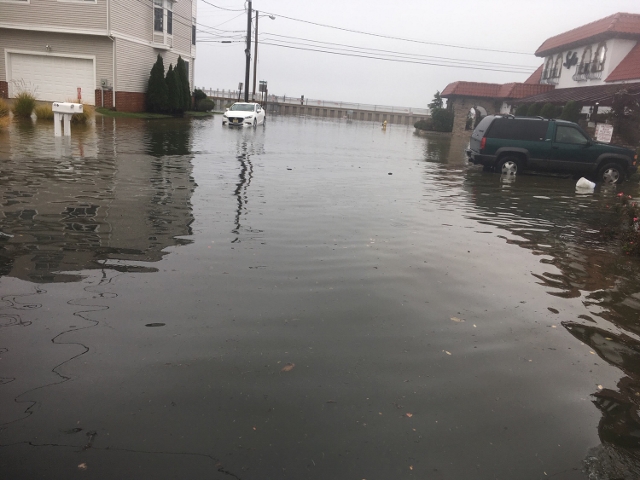 TRENTON The Department of Environmental Protection Thursday, Dec. 12 released a new study projecting dramatic sea-level rise in New Jersey. According to the report, sea-level in New Jersey could rise from 2000 levels by up to 1.1 feet by 2030, 2.1 feet by 2050 and 6.3 feet by 2100.
TRENTON The Department of Environmental Protection Thursday, Dec. 12 released a new study projecting dramatic sea-level rise in New Jersey. According to the report, sea-level in New Jersey could rise from 2000 levels by up to 1.1 feet by 2030, 2.1 feet by 2050 and 6.3 feet by 2100.
The projections underscoring the urgency of the Murphy Administration's adaptation work to make the state more resilient to the effects of climate change. The report also shows that New Jersey has already been disproportionately affected by climate change - sea-level rise projections in New Jersey are more than two times the global average, according to a release.
The Rising Seas and Changing Coastal Storms study, prepared by Rutgers University and leading climate change experts, was released Thursday during the first meeting of the newly formed Interagency Council on Climate Resilience. The council, comprised of representatives from 17 state agencies and chaired by the Governor's Office, was formed by Gove. Murphy's recent Executive Order 89, which commits the state to developing and implementing a Statewide Climate Resilience Strategy. The meeting was held at DEP headquarters in Trenton. The council will facilitate a whole-of-government response to the climate crisis.
New Jersey is extremely vulnerable to the impacts of climate change and we must work together to be more resilient against a rising sea and future storms, Gov. Phil Murphy said. The data presented in this report will not only guide the Interagency Council's decisions, but will also advise future generations of leaders on how to best mitigate the devastating effects of climate change.
New Jersey has much to lose if we do not act quickly and decisively to adapt to the realities of climate change, DEP Commissioner Catherine R. McCabe said. This study illustrates the sobering reality that our coastal landscape will change drastically, and we must act with urgency to ensure the long-term viability of our coastal and waterfront communities. These projections now serve as important baselines for developing policy directions, including changes to land use regulation, that New Jersey must adopt to address these challenges.
Sea-level rise drives some of the greatest hazards New Jersey faces from climate change. Building upon three years of on-the-ground experience since the release of Rutgers' first Science and Technical Advisory Panel sea level assessment, which was conducted for the New Jersey Climate Change Alliance, this report presents the state of the scientific understanding of sea level rise and changing coastal storms in a form designed to support state and local efforts to protect New Jersey's coastal communities, said lead author Robert Kopp, a climate scientist and director of the Rutgers Institute of Earth, Ocean, and Atmospheric Sciences. As the State University of New Jersey, Rutgers is proud to bring our expertise to bear to advance climate action in our state.
The study team was comprised of leading experts and coastal researchers from DEP, Rutgers University, the U.S. Geological Survey, Columbia University, the Barnegat Bay Partnership, Rowan University, Princeton University, the Stevens Institute of Technology, Drexel University, the U.S. Geological Survey, the National Oceanic and Atmospheric Administration, the Jacques Cousteau Coastal Education Center, the New Jersey Association of Flood Plain Management, the U.S. Army Corps of Engineers, the New York City Mayor's Office of Resiliency, and the U.S. Environmental Protection Agency.
 While the frequency of tropical and extra-tropical cyclones, such as nor'easters, may not change drastically, the report notes that wind speeds and precipitation rates from these storms are likely to increase, although this issue needs more study. The study also suggests that storm tracks may change as global warming intensifies.
While the frequency of tropical and extra-tropical cyclones, such as nor'easters, may not change drastically, the report notes that wind speeds and precipitation rates from these storms are likely to increase, although this issue needs more study. The study also suggests that storm tracks may change as global warming intensifies.
Over the last 40 years, sea-level rose an average of 0.2 inch per year along the state's coast, compared to a global average of 0.1 inch per year. The study also notes that the frequency of routine tidal flooding not associated with specific storms has increased, from an average of less than one event in Atlantic City between 1950 and 1960 to an average of eight events per year between 2007 and 2016 and a high of 18 events in 2009. By 2100, high-tide cycle flooding could become a regular occurrence, at 240 days per year.
As part of its evaluation, Rutgers determined that sea-level from 1911 (the beginning of tide-gauge record-keeping) at Atlantic City has risen 17.6 inches, compared to 7.6 inches globally. Moreover, sea-level has risen 8.2 inches over the past 40 years at Atlantic City, compared to an average 4.3 inches globally.
The Murphy administration has made addressing climate change a priority for the state. Gov. Murphy joined the US Climate Alliance, a bipartisan coalition of states committed to the Paris Climate Treaty goals in the absence of federal leadership and precipitated by the Trump administration's decision to remove the U.S. from the international Paris accord.
In October, on the seventh anniversary of Superstorm Sandy, Murphy signed Executive Order 89, which directs the state, through the DEP, to develop a Statewide Climate Change Strategy to guide decisions and policies across state government.
The executive order also formed a Climate and Flood Resilience Program within the DEP and created the Interagency Council on Climate Resilience to promote the long-term mitigation, adaptation and resilience of New Jersey's economy, communities, infrastructure and natural resources.
New Jersey is particularly susceptible to the impacts of rising oceans due to its long coastline, the long-term natural sinking of land through subsidence, its latitudinal position in relation to the bulging of oceans caused by the Earth's rotation, ocean circulation patterns and other factors.
Funding was provided through the National Oceanic and Atmospheric Administration.
For a copy of the report and report summary, visit www.nj.gov/dep/climatechange/resilience.html.
For more information on climate change and resilience from the DEP, visit www.nj.gov/dep/climatechange/